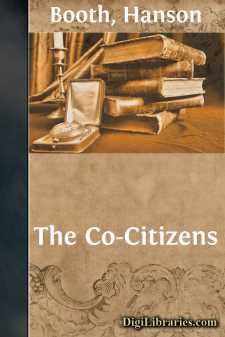Categories
- Antiques & Collectibles 13
- Architecture 36
- Art 48
- Bibles 22
- Biography & Autobiography 813
- Body, Mind & Spirit 142
- Business & Economics 28
- Children's Books 14
- Children's Fiction 11
- Computers 4
- Cooking 94
- Crafts & Hobbies 4
- Drama 346
- Education 46
- Family & Relationships 57
- Fiction 11829
- Games 19
- Gardening 17
- Health & Fitness 34
- History 1377
- House & Home 1
- Humor 147
- Juvenile Fiction 1873
- Juvenile Nonfiction 202
- Language Arts & Disciplines 88
- Law 16
- Literary Collections 686
- Literary Criticism 179
- Mathematics 13
- Medical 41
- Music 40
- Nature 179
- Non-Classifiable 1768
- Performing Arts 7
- Periodicals 1453
- Philosophy 64
- Photography 2
- Poetry 896
- Political Science 203
- Psychology 42
- Reference 154
- Religion 513
- Science 126
- Self-Help 84
- Social Science 81
- Sports & Recreation 34
- Study Aids 3
- Technology & Engineering 59
- Transportation 23
- Travel 463
- True Crime 29
The Co-Citizens
by: Hanson Booth
Description:
Excerpt
CHAPTER I
When Sarah Hayden Mosely died, she did something. Most people do not. They cease to do. They are forgotten. The grass that springs above their dust is the one recurrent memory which the earth publishes of them long after the world has been eased of their presence, the fever of their prayers and hopes. It was the other way with this dim little old woman. During the whole of her life she had never done anything. She was one of those faint whispers of femininity who missed the ears of mankind and who faded into the sigh of widowhood without attracting the least attention. She was simply the "relic" of William J. Mosely, who at the time of his death was the richest man in Jordantown. And by the same token, after his death, Sarah became the richest woman. She had no children, no relatives. She was detached in every way, even from her own property, which was managed by the agent, Samuel Briggs, and was still known as the "William J. Mosely Estate." She attended divine service every Sunday morning, always wearing a black silk frock and a black bonnet tied under her sharp little chin, always sitting erect and alone in her pew, always staring straight in front of her, but not at the minister. Recalling this circumstance afterward, Mabel Acres said:
"She must have been thinking of that all the time, not of the sermon."
She paid one dollar a year to the Woman's Home and Foreign Missionary Society and twenty cents extra for "incidentals." She contributed five dollars each quarter toward the Reverend Paul Stacey's salary. And she never, under any circumstance, gave more, no matter how urgent the appeal. She was suspected of being a miser. There was nothing else of which she could be suspected. So far as any one knew in Jordantown, she permitted herself only one luxury: this was a canary bird, not yellow, but green. It was a very old bird, as canaries go. Somebody once said: "Old Sarah's making her canary last as long as possible!" Every night when she retired to her room, she took the cage in with her, hung it above her bed on a hook, and threw her petticoat over it to keep the bird quiet during the night.
On the morning of the 6th of April Mrs. Mosely did not appear at the usual hour, which was six o'clock. The maid waited breakfast until the toast was cold. Then she went to the door and knocked. No reply. She opened the door, and fell with a scream to the floor. Something soft and swift like wings brushed her face. She could not tell what it was. She saw nothing.
The gardener, hearing her cries, ran in. They both approached the bed. They beheld the face of their mistress looking like the yellowed dead petals of a rose, wrinkled, withered, awfully still on the pillow.
The woman screamed again.
"She's dead! it was her spirit that brushed my face just now!"
"No, it was the canary. The cage is empty," said the gardener.
"I tell you the thing I felt was white!" cried the woman.
"Felt! If you'd looked, you'd have seen it was that green canary!" persisted the man.
This was the beginning of a great whispering uproar in Jordantown, of violent curiosity and anxious speculation.
No one ever called upon Sarah, and she never made visits. Now every one came. They listened to the maid's story. All the little boys in town were looking for the canary. They never found it.
"I told you so!" sniffled the maid.
On the day of the funeral all the business houses in Jordantown were closed. It was as if a Sabbath had dropped down in the middle of the week. Pale young clerks lounged idly beneath the awnings of the stores. Servants stared from the back doors. Sparrows rose in whirls from the dust and screeched ribald comments from the blooming magnolia trees. The funeral procession was a long one, and included all the finest automobiles and all the best people in Jordantown—not that the best people had ever known the deceased, but most of them sustained anxious, interest-bearing relations to the William J....



